
Privacy as a Constitutional Right: Sex, Drugs, and the Right to Life
(Hardback)
Publishing Details
Privacy as a Constitutional Right: Sex, Drugs, and the Right to Life
By (Author) Jon D. Bible
By (author) Darien McWhirter
Bloomsbury Publishing PLC
Praeger Publishers Inc
23rd June 1992
United States
Classifications
Tertiary Education
Non Fiction
Human rights, civil rights
Jurisprudence and general issues
Social and cultural history
347.302858
Physical Properties
Hardback
224
Description
The United States Supreme Court is on the verge of overturning Roe vs Wade. When it does, that decision may be as important as the Dred Scott decision a century and a half ago. During the confirmation hearings for Clarence Thomas the focus was on the constitutional right to privacy and abortion. No legal concept has been more controversial and has had such a significant impact on the lives of millions of Americans. This book aims to provide a comprehensible overview of the Supreme Court decisions concerned with privacy issues such as sex, drugs, abortion, and the right to die. The legal evolution of the constitutional right to privacy is explored with every significant Supreme Court decision explained along the way. This book begins with an overview of the legal history that has led to the development of a constitutional right to privacy. The relationship between morality and law are presented from the Hittites to the Puritans. The impact of the ideas of philosophers such as Locke, Montesquieu, Rousseau, and Mill are presented along with an overview of the concepts of natural law and natural rights. The development of the right to privacy in American Common Law is presented. The important Supreme Court decisions on privacy are discussed in detail from Griswald to Roe vs Wade.
Reviews
McWhirter (an attorney) and Bible (Southwest Texas State University) offer a clear, readable, and comprehensive work on the constitutional right of privacy in all its various forms. Although the seasoned privacy scholar will find little that is new, the book provides general readers, students, and casual observers with a marvelous treatise that compiles most of what is known about privacy for even the most involved expert. In a very interesting and highly readable way, this volume presents the historical, philosophical, constitutional, and common law foundations of privacy from prehistory to the present. In addition, the authors review the various guises of the privacy right (sex and marriage; life and death; mind and body), thoroughly analyzing the major federal and state court cases in each. To their great credit the authors examine state constitutional rights to privacy as well as federal--an important development given the conservative nature of the US Supreme Court in the latter 20th century. Any work on privacy that ranges from the code of Hammurabi and the Hittite law codes to John Locke and Montesquieu to William O. Douglas and William H. Rehnquist deserves special attention, especially when the analysis is as methodical, complete, and well done as this one. The only criticism (and a minor one, to be sure) is the lack of a bibliography. Highly recommended for readers at all levels.-Choice
"McWhirter (an attorney) and Bible (Southwest Texas State University) offer a clear, readable, and comprehensive work on the constitutional right of privacy in all its various forms. Although the seasoned privacy scholar will find little that is new, the book provides general readers, students, and casual observers with a marvelous treatise that compiles most of what is known about privacy for even the most involved expert. In a very interesting and highly readable way, this volume presents the historical, philosophical, constitutional, and common law foundations of privacy from prehistory to the present. In addition, the authors review the various guises of the privacy right (sex and marriage; life and death; mind and body), thoroughly analyzing the major federal and state court cases in each. To their great credit the authors examine state constitutional rights to privacy as well as federal--an important development given the conservative nature of the US Supreme Court in the latter 20th century. Any work on privacy that ranges from the code of Hammurabi and the Hittite law codes to John Locke and Montesquieu to William O. Douglas and William H. Rehnquist deserves special attention, especially when the analysis is as methodical, complete, and well done as this one. The only criticism (and a minor one, to be sure) is the lack of a bibliography. Highly recommended for readers at all levels."-Choice
Author Bio
DARIEN A. McWHIRTER is an attorney and consultant. He received his Ph.D. in political science from Yale University and his J.D. from the University of Texas Law School. He is the author of Your Rights at Work (1989), and co-author of Privacy in the Workplace (Quorum, 1990). JON D. BIBLE is an Associate Professor of Business Law at Southwest Texas State University. He received his M.A. in American Studies and his J.D. from the University of Texas. He has published numerous articles on the law and is a co-author of Privacy in the Workplace (Quorum, 1990).
